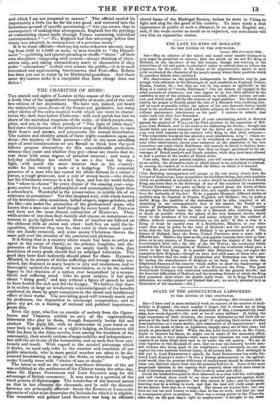THE LATE EX-KING OF HOLLAND.
TO THE EDITOR OF THE SPECTATOR.
Sussex, 86th December 1843.
SIR—May an admirer of the talent and sound sense usually displayed in your paper be permitted to observe, that the article on the late Ex-King of Holland, in the Spectator of the 23d instant, though not wanting in the attractions of wit and point, is calculated rather to mislead than to inform the judgment ; for the writer, in his desire to be epigrammatic, seems to have quite overlooked the character of the people among whom those qualities which he considers defects were exhibited.
His observations on the qualities indispensable in Monarchs may be just enough with reference to the Sovereigns of such countries as England, France, Russia, Austria, &c.; but they are not by any means so applicable to the King of a nation of "steady Dutchmen," who are almost all engaged in the sober pursuits of commerce, and who appear to be but little affected by the ambition or any of the ordinary excitements to which other nations are sub- ject, and which most call for the exercise of regal qualities. The Dutch seem exactly the people to flourish under the rule of a Monarch who, confining him- self as much as possible within the sphere of his own domestic duties, would trust to the prudence of his staid and sedate subjects for the conduct of affairs, without unnecessary interference on his part. I venture to submit, that under such rule they have flourished.
In point of fact, the greater part of your entertaining article is directed against the conduct of WILLIAM the First previous to the separation of Bel- gium from Holland, and to his motives for abdicating his throne ; though one should think you must commend him for the latter act, since you conclude your very brief remarks on his conduct while King in this short sentence- " The respectable bourgeois has proved a most mischievous king " : which re- mark, however, can hardly be said to be elucidated or supported by any of your other observations, except your comment on the separation of the two countries,—an event which Dutchmen will scarcely be found to deplore, how- ever much the Belgians may regret that they no longer participate in the ad- vantages of Dutch markets and Dutch colonies, while they have been allowed to bear a portion of the burden of Dutch debts. I am sure, from your general candour, you will excuse me for-commenting on an article, the attractive style of which seems to me calculated to mislead, by causing the readers of it to overlook the fallacy on which it is founded. I am, Sir, your obedient servant, Swum. [Our flattering correspondent will excuse us for not seeing clearly how the instinct of domination, large sympathies for his fellow-beings, and other qualities which we predicated as necessary in a ruler, should be uncalled-for in a Dutch King, any more than in the Sovereign of any of the countries he enumerates. " Steady Dutchmen" are quite as likely to quarrel about the limits of their relative rights and duties as any other men, and equally require a ruler to en- force the authority of the law. To be a popular Monarch, different shades of qualities may be required in France, England, and Holland ; but, to make a useful King, the qualities of the statesman will be alike required in all. According to our correspondent's view of the matter, the Dutch are a nation of philosophers, who require no government: they are " exactly the people to flourish under the rule of a Monarch who, confining himself as much as possible within the sphere of his own domestic duties, would trust to the prudence of his staid and sedate subjects for the conduct of affairs, without unnecessary interference on his part." If this is true of a King, it must be equally true of a Stadtholder, Minister, or any other name that may be given to the ruler of Holland; and the position comes to be, that the best government for Holland is no government at all. The history of Holland, since the Seven United Provinces were a state, tells a different tale. Faction has been as rife, and popular tumults have been as fero- cious, as in any country of Europe. Bear witness the history of the Earl of LEICESTER'S brief rule ; the fate of the DE WITTS ; the revolution which preceded the French occupation of Holland; and the revolution which gave a crown to the late King. It is possible that Dutchmen may not regret the separation from Belgium,—though we have met with some of them who pro- fessed to believe that the trade of Amsterdam and Rotterdam was the better for having the manufactures of Belgium at its back. But even then, the dilapidated finances of the country would suffice to show the disadvantage of having a Sovereign so engrossed in self as WILLIAM the First. The great Netherlands Company was instituted ostensibly for the general benefit; but the financial difficulties of Holland, and the immense fortune of which the King died possessed, show where the profits really went. As to King WILLiAM's abdication, we neither praised nor blamed that act; we merely adverted to it as illustrative of his character.—ED.]






























 Previous page
Previous page